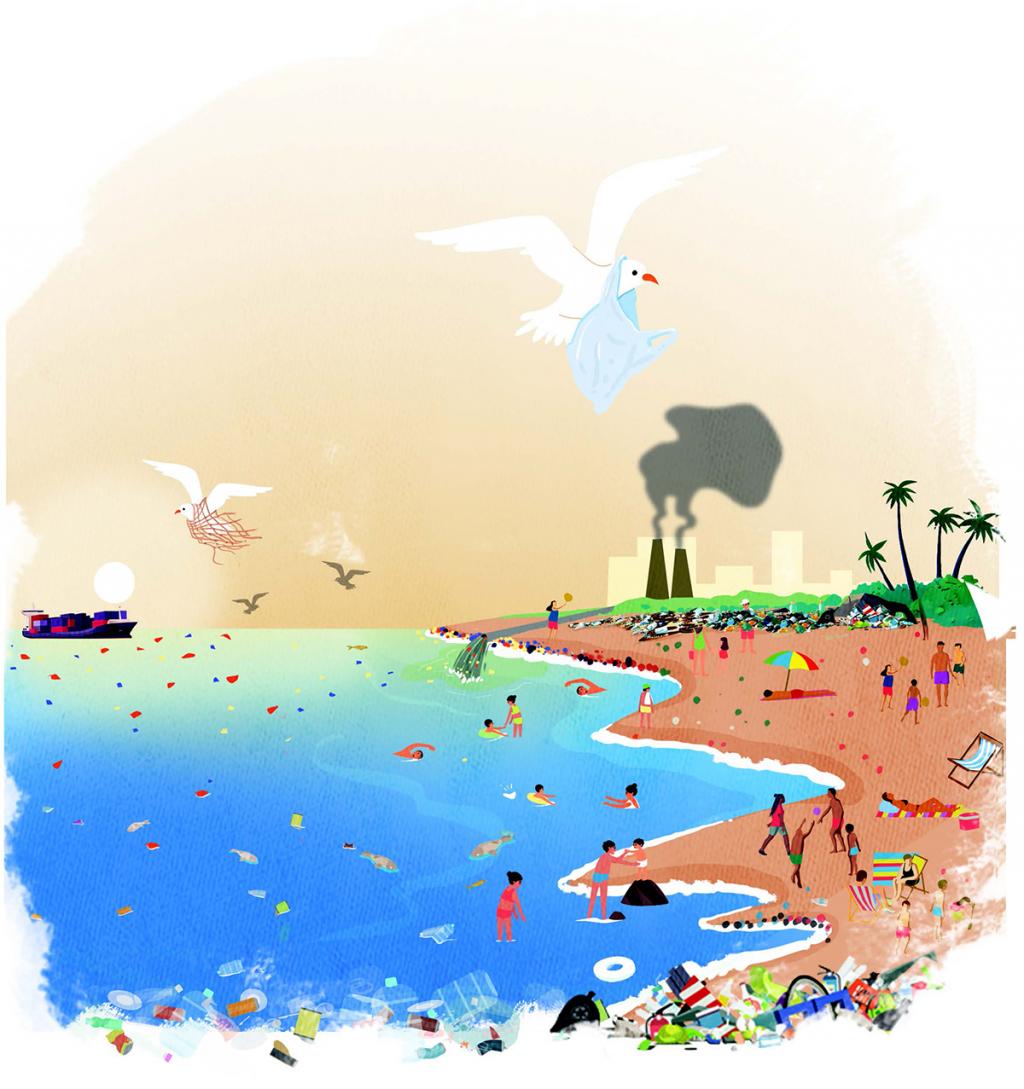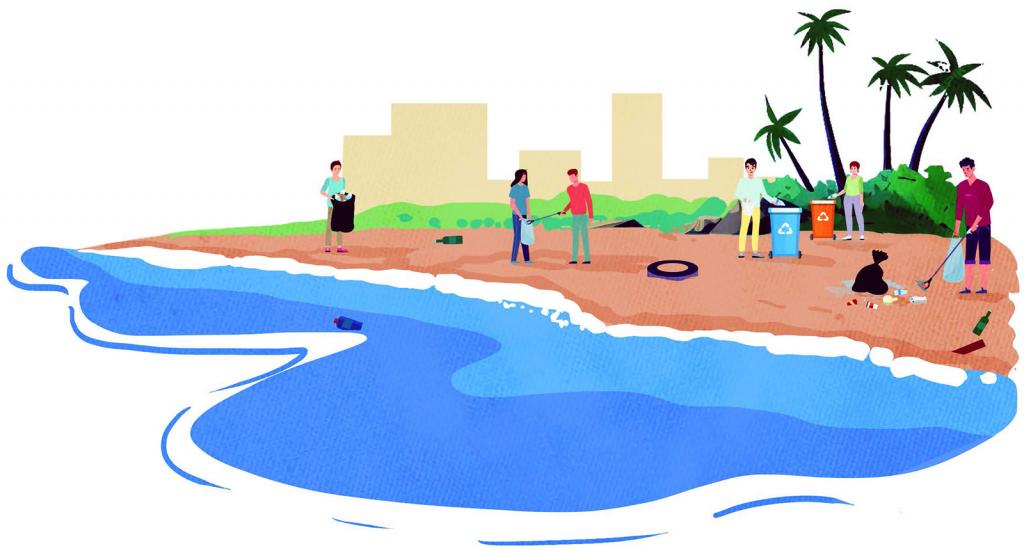
Explore how plastic, oil, chemicals, and even noise are choking marine life—and what we can do to help.
What is Marine Pollution?
Take a moment to close your eyes and imagine our beautiful blue oceans, full of fishes and marine life, and sparkling clear water. Now, imagine if someone dumped garbage into our beautiful oceans– not just plastics, but sewage waste, oils and chemicals! This atrocity is called ‘marine pollution’! Marine pollution means when humans and societies dump their harmful trash into the sea, making it unsafe and unhealthy for both the fishes and humans.
Why is Marine Pollution a Problem?
Marine pollution is a huge problem because it hurts our planet and all its inhabitants, including us!
Firstly, it's extremely dangerous for marine animals. They face dangers from different types of pollutants every single day. Some of them include:
Plastic: Imagine a hungry sea turtle mistaking a floating plastic bag for a yummy jellyfish. When they eat plastic, it fills their stomachs, making them feel full even when they haven't eaten real food, which can make them very sick or even starve to death. Thousands of seals, dolphins, seabirds and whales get tangled in old fishing nets or plastic ropes. These "ghost nets" can tightly wrap around their bodies, making it hard for them to swim, breathe, or find food.
Oil: Many big ships dump their oil into the sea, and it can happen accidently too! But that oil covers birds' feathers and animals' fur, making it impossible for them to fly or stay warm. It also destroys colourful coral reefs which are vital for marine health.
Chemicals: Chemicals from factories or farms are ingested by fish and other tiny sea creatures which are make them very sick, and even make it hard for animals to have babies.
Too much nutrients (Eutrophication): Sometimes, too much nutrients (like fertilizers) make their way into the ocean which causes phytoplankton (tiny plants) to grow superfast. This, in turn, blocks sunlight and utilise all the oxygen in the water when they decompose. If sunlight doesn’t enter the ocean, it can create “dead zones” and it is dangerous for fish and other sea creatures as they can't breathe.
Noise: Very loud sounds from big ships or underwater construction can confuse whales and dolphins who use sound to communicate to each other, find food, and navigate. It's like trying to find your way in a very noisy room!
Secondly, marine pollution dirties our beaches and the scenery. No one wants to play on a beach covered in plastic bottles and wrappers, right? Beyond visible trash, oil spills can leave beaches gooey and unsafe for a long time. This also affects fishermen as pollution can damage their boats and fishing gear, consequently, they cannot catch enough fish.
Thirdly, it can even affect us! When plastic breaks down in the ocean, it becomes tiny pieces called ‘microplastics’. These microplastics are eaten by small fish, which are then eaten by bigger fish, and eventually, these bigger fish might end up on our dinner plates! So the harmful plastics make their way into our tummies! We don’t want to eat plastics, right?
Finally, it harms the health of our blue planet. Our oceans are incredibly important for the air we breathe and the climate we live in. Marine pollution can disrupt the natural balance of these vital ecosystems. It’s like the ocean’s cry for help saying, “Help, I’m sick!”

Where Does Marine Pollution Come From?
A total of 80 per cent of ocean pollution, especially plastic, comes from land-based sources. This means it comes from our streets, our homes, and our communities!
Think about it.
Littering: When someone throws a plastic wrapper, an old battery, or other trash on the road instead of in a dustbin, it can be blown by the wind or washed by rain into the drains, rivers, and eventually, the sea.
Poor waste management: In many places, including several parts of India, waste is not collected or disposed of properly. Sometimes open dumps or overflowing bins can cause plastics to wash into the oceans.
Runoff from land: Rain washes fertilizers and pesticides from farms, which then pollute the sea. Even everyday things like soap from washing cars are eventually harming the oceans.
Industrial activities: Factories release toxic wastewater directly or indirectly into rivers and coasts.
Coastal tourism & sewage: Popular tourist spots generate a lot of waste and sometimes untreated sewage, and if not managed well, it ends up on beaches and in the sea, adding both visible trash and invisible pollutants.
Loud activities: Near the coasts, things like dredging (digging up the seabed), building new ports, or even loud boat engines can create noise pollution that travels far underwater.
So, now we know that even the plastics from Delhi to the runoff from coasts in Cochin, have a direct impact on the health of our oceans far away. Every piece of plastic we use and throw away, every drop of chemical that washes into a drain, has a journey, and we need to make sure this journey ends safely, not in the ocean!
How Can Marine Pollution Be Tackled?
The good news is that we can all work together to solve it! With teamwork from governments, communities, and every one of us, we can save our oceans!
Government Schemes: Governments around from the world, including India, are stepping up. India's ‘Swachh Bharat Abhiyan’ (Clean India Mission) works to improve waste management across the country, so it doesn’t end up in waterbodies. There are also new rules drafted to ban certain single-use plastics, like plastic bags and straws, in many states. Governments are also working to treat wastewater before it reaches the ocean, and make stricter laws to control industrial pollution.
Our Community Measures: It is not just governments who are making efforts, but local communities are also stepping up! Many towns and villages organize beach clean-ups regularly, where volunteers pick up trash by the beach. Schools are educating students about recycling, reducing waste, and raising awareness about pollution sources. For example, many schools in India now have separate bins for different types of waste.
But more importantly, what can YOU do to help clean the oceans?
Your contribution matters! Little, conscious efforts can go a LONG way in preserving marine ecosystem.
What YOU Can Do: The most important step is for you to reduce your "irrational and unwanted plastic use" and be mindful of other pollutants. That means:
Conclusion
Every single action, no matter how small, can make a difference! When you choose a reusable water bottle instead of a plastic one, you're sending a big message: "I care about our planet!"
Now, let us close our eyes and imagine once again, an ocean free of plastic and harmful substances, where turtles swim happily without mistaking bags for food, coral reefs are vibrant and healthy, and beaches sparkle clean and safe for everyone to enjoy. This future is possible if we all work together!
Let's make smart choices and inspire others to do the same! Together, we can create a cleaner, healthier blue planet for everyone.